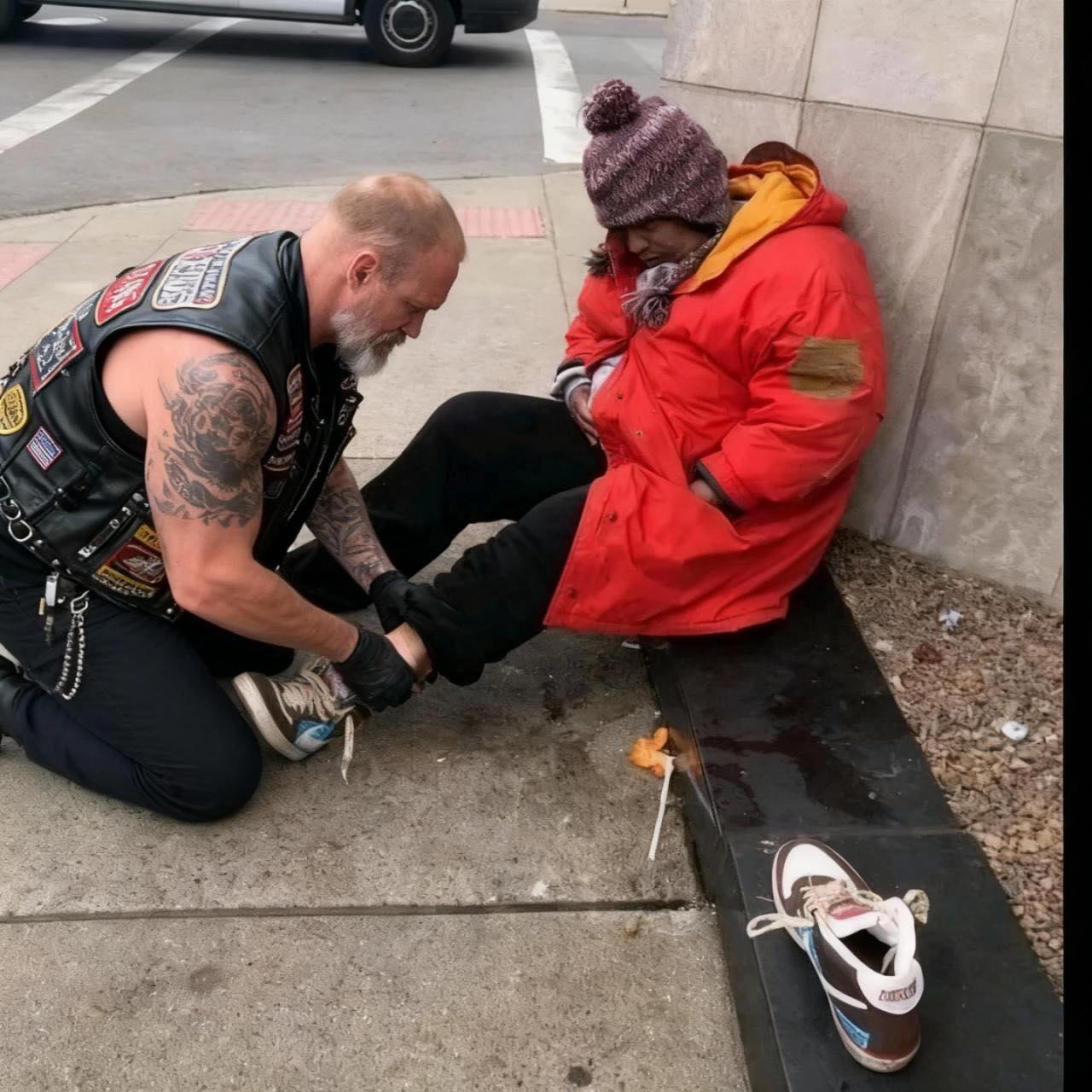For seven years, I’ve walked the same downtown patrol route—same blocks, same trouble spots, same familiar faces. But every now and then, something happens that completely changes the way you see people. For me, that moment started with a barefoot woman in a red coat… and a biker who refused to give up on her.
Her name is Miss Rose, at least that’s what the locals call her. She’s in her seventies, tiny as a sparrow, always wrapped in the same faded red coat. She’s been sitting on the same street corner as long as I’ve been on this beat—through heat waves, snowstorms, and everything in between. People bring her food, blankets, even socks, yet almost always she’s barefoot, or wearing shoes so worn they barely hold together.
Countless people have tried to help her. She accepts food and blankets—but never shoes. Not once.
Then came the biker.
A big man. Leather vest. Gray beard like steel wool. Tattoos climbing his neck. Every Tuesday at exactly 9 AM, he arrived carrying a shoebox—not cheap shoes, but good, quality shoes. He’d kneel down, speak gently, offer them—and each time, she refused.
Three months straight. Every Tuesday. He kept coming back.
One freezing February morning—fifteen degrees, wind cutting through my uniform—I finally approached him.
“You’re wasting your time,” I said. “She’ll never take them.”
He looked up with clear, steady blue eyes. “I know she won’t take them. Not yet.”
“Then why keep trying?”
“Because she hasn’t told me why. Until she does, I’m not done.”
He walked past me and sat beside her on the icy sidewalk as if the cold didn’t touch him.
“Good morning, Miss Rose,” he said softly. “I brought you something.”
She gave him that sad little smile she always gave. “Baby, I can’t take those. Save them for someone who needs them.”
“You need them,” he replied. “You’re freezing.”
“Doesn’t matter,” she whispered. “I just can’t wear new shoes.”
He didn’t push. He didn’t act frustrated. He just sat next to her, pulled out a thermos, and poured her a cup of hot coffee.
“At least tell me why,” he said. “I’ll stop asking if you tell me why.”
Miss Rose hesitated, her hands trembling around the cup. Finally, she nodded.
“It’s a long story,” she murmured. “And you’ll probably think I’m crazy.”
“I won’t,” he said.
She stared at her battered shoes—duct tape, holes, no laces—and spoke softly.
“These are the first shoes I ever bought with my own money.”
The biker didn’t flinch. He just listened.
“I grew up poor in Alabama. Dirt poor. We went barefoot most days. When I was seven, I stepped on a rusty nail. We didn’t have a doctor. Mama wrapped my foot in rags and prayed.”
She took a shaky breath.
“When I was twelve, the church handed out donated shoes. None fit. My feet bled for months until the leather softened. I promised myself I’d buy a pair that fit properly one day.”
Her voice cracked.
“I had my first baby at sixteen. Daddy kicked me out. I walked barefoot from Alabama to Tennessee—240 miles. My feet bled the whole way. I lost the baby halfway there.”
The biker gently placed his hand over hers. Miss Rose kept going.
“I worked forty-three years after that—cleaning houses, washing dishes, anything I could get. Every penny went to my other kids. I wore whatever shoes I could scavenge.”
Her lips trembled.
“When my youngest graduated high school—the first in my family—I had fifty-seven dollars left after bills. I walked into a shoe store for the first time in my life. Tried on every pair I could. I chose these red sneakers. Forty-three dollars.” She lifted her foot. “These ones right here.”
The biker stared at them as if they were sacred.
“Thirty-eight years ago,” she whispered. “Only shoes I ever bought for myself. Only thing in my life that was truly mine.”
She wiped her cheeks. “People think I’m crazy, but if I threw them away… it would be like throwing away proof I mattered. Shoes aren’t just shoes to me.”
The biker nodded slowly. “Can I tell you something too?”
She nodded.
“I’m Thomas. Sixty-six. I’ve been sober thirty-eight years—the same as you’ve had those shoes.”
He unzipped his vest and revealed a worn, patched-up jacket.
“This jacket saved my life. A stranger gave it to me when I was homeless and drinking myself to death. I wore it long after I got sober. Long after I could buy ten new jackets. I couldn’t let go. It wasn’t just a jacket. It was proof someone saw me as human.”
He looked into her eyes.
“I understand holding on to something because it’s the only thing that ever told you you mattered.”
Then he opened the shoebox. Inside: a pair of brand-new red sneakers, size eight and a half.
“I’m not asking you to replace the past,” he said. “I’m asking you to let it rest. I’ll have your old shoes preserved in a case. You’ll keep them forever. But you’ll also have warm feet.”
Miss Rose sobbed—for the first time in decades, letting out years of hurt.
Thomas carefully removed her old shoes, wiped her feet with a warm cloth, put on socks, then the new shoes.
“They fit,” she whispered.
“Just like the first pair,” he smiled.
Two weeks later, her old shoes were sealed in a glass case with a plaque. She kept it in her cart like a treasure.
Four years have passed. Thomas still comes every Tuesday with coffee and conversation. Miss Rose now lives in a shelter—but only after he found one that allowed her to keep all her belongings, including the case.
People think this story is about shoes.
It isn’t.
It’s about dignity. About being seen. About the kind of love that doesn’t give up—the kind that sits on a frozen sidewalk and waits until someone finally trusts you enough to tell your story.
Because Thomas did, everything changed.
